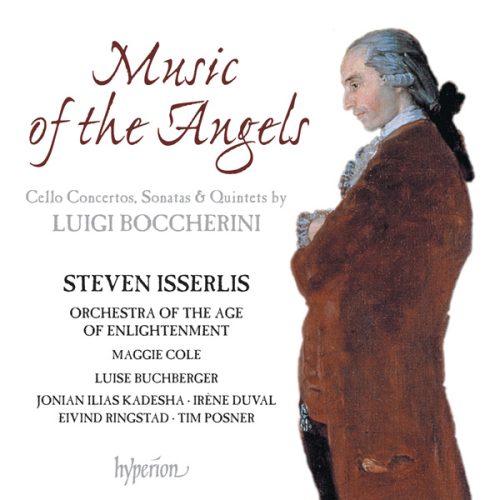‘Has there ever been a composer of more consistent elegance?’ If Steven Isserlis’s rhetorical question invites the listener to think of plausible alternatives, on the evidence of this wonderful album—an imaginative selection of Boccherini’s cello concertos and cello-centric chamber music—they are most unlikely to succeed. This is truly ‘music of the angels’, with performances to match.Luigi Boccherini—is it just association, or does the name itself emanate a sense of magical refinement? Whichever, the music certainly conveys that impression, to an extraordinary extent; has there ever been a composer of more consistent elegance? No matter how impassioned the mood, how martial and dramatic, or how tender, Boccherini’s art is always attired in sumptuous clothing, radiating grace. Unlike his near-contemporary Joseph Haydn, Boccherini rarely seeks to shock; he prefers instead to create for his players and listeners a sphere of ideal beauty, of sophisticated sentiments—and in that he succeeded like no other. Compared to both Mozart and Haydn, he may seem somewhat innocent, almost naive; but that is a misleading impression—he is merely different. They, pursuing much of their careers at the centre of musical life in Vienna, were of this world; Boccherini, who spent more than half of his life in far-off Spain, inhabited his own, idyllic realm of the senses. In the well-known words of the French publication quoted above: ‘If God wanted to speak to man through music, he would do so through the works of Haydn; if, however, he wished to listen to music himself, he would choose the works of Boccherini.’It is perhaps in part because of his unworldliness that Boccherini’s reputation has never really matched his achievements—even now. It is true that he has always had his fans (including, interestingly, Chopin, whose use of sonata form noticeably resembles that of Boccherini); but until surprisingly recently, the only two Boccherini works that were heard regularly in the concert hall are the ‘Minuet in F’ (actually in A, from a quintet in E), played in various arrangements, and his cello concerto in B flat—in a (for me, anyway) ghastly Victorian version that bears very little resemblance to Boccherini’s original. It is fair to say, in fact, that it is only within the last fifty years or so that any of his approximately 600 works have been heard in versions that he would have recognized—and then all too rarely. Hard to believe, but true. Even today, it can be difficult to find faithful editions of his music; but at least there are such editions now available. And what treasures have been rediscovered! ….01. Steven Isserlis – Cello Concerto No. 6 in D Major, G. 479 I. Allegro02. Steven Isserlis – Cello Concerto No. 6 in D Major, G. 479 II. Adagio03. Steven Isserlis – Cello Concerto No. 6 in D Major, G. 479 III. Allegro04. Steven Isserlis – Cello Sonata in C Minor, G. 2 I. Allegro05. Steven Isserlis – Cello Sonata in C Minor, G. 2 II. Largo06. Steven Isserlis – Cello Sonata in C Minor, G. 2 III. Allegretto07. Steven Isserlis – String Quintet in D Minor, G. 280 I. Allegro08. Steven Isserlis – String Quintet in D Minor, G. 280 II. Andante sostenuto09. Steven Isserlis – String Quintet in D Minor, G. 280 III. Fuga. Allegro giusto10. Steven Isserlis – Cello Sonata in F Major, G. 9 I. Andantino11. Steven Isserlis – Cello Sonata in F Major, G. 9 II. Adagio assai12. Steven Isserlis – Cello Sonata in F Major, G. 9 III. Tempo di minuetto amoroso13. Steven Isserlis – Cello Concerto No. 2 in A Major, G. 475 The Frog I. Allegro14. Steven Isserlis – Cello Concerto No. 2 in A Major, G. 475 The Frog II. Adagio15. Steven Isserlis – Cello Concerto No. 2 in A Major, G. 475 The Frog III. Rondo. Allegro16. Steven Isserlis – String Quintet in E Major, Op. 115, G. 275 III. Minuetto – Trio – Minuetto da capo13222990066/49.72.150.151


